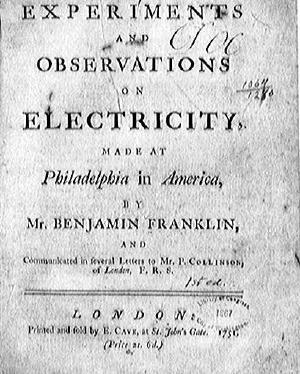 Benjamin Franklin was the 10th of 17 children of a soap and candle maker. He left school at the age of 10 and at 12 became apprentice to his brother, who worked as a printer in Philadelphia and later in London.
Benjamin Franklin was the 10th of 17 children of a soap and candle maker. He left school at the age of 10 and at 12 became apprentice to his brother, who worked as a printer in Philadelphia and later in London.Inventor, scientist and diplomat, b. 17 (6*) January 1706 (Boston, Massachusetts), d. 17 April 1790 (Philadelphia, USA).
 Benjamin Franklin was the 10th of 17 children of a soap and candle maker. He left school at the age of 10 and at 12 became apprentice to his brother, who worked as a printer in Philadelphia and later in London.
Benjamin Franklin was the 10th of 17 children of a soap and candle maker. He left school at the age of 10 and at 12 became apprentice to his brother, who worked as a printer in Philadelphia and later in London.
As a printer's apprentice Franklin trained himself in writing by recreating magazine articles from memory and comparing his version with the original. At the age of 16 he established his own weekly newspaper, the New England Courant.
The printing business in the colonies still depended much on support from the homeland, and Franklin worked for two years in London. On his return to Philadelphia he managed to establish his own business and receive the contract for the printing of Pennsylvania's paper money. In 1729 he started the Pennsylvania Gazette, soon regarded one of the best colonial newspapers.
In 1732 Franklin started the annual publication of the Poor Richard's Almanack, a vehicle to promote the Protestant work ethic of thrift, prudence, honesty and industry through collections of proverbs and short notes, using the pseudonym Richard Saunders. Among the condensed formulas of advice that made it into everyday English are "An ounce of prevention is worth a pound of cure" and "Early to bed and early to rise, makes a man, healthy, wealthy, and wise."
Five years earlier Franklin had already created the Junto or Leather Apron Club as a debating club for issues of morals, politics, natural philosophy and business affairs. Over the years the club spawned several initiatives for the public good such as a paid police force, a voluntary fire brigade and a lending library. A call for "constant correspondence" of men with scientific interests in 1743 led to the formation of the American Philosophical Society in the same year. In 1749 Franklin published Proposals Relating to the Education of Youth in Pennsilvania, which led to the foundation of the University of Pennsylvania in 1751.
The development of science teaching through Franklin's efforts made his name known in European scientific circles. Shortly before 1746 the Library Company received an electricity-generating machine from London. Franklin and his friends began to study electrical phenomena and summarized their findings in Experiments and Observations on Electricity in 1751. The work was translated into French in 1752, German in 1758 and Italian in 1774 and led to Franklin's invention of the lightning rod.
Franklin held many public posts. He was clerk of the Pennsylvania legislature from 1736 to 1751 and postmaster of Philadelphia from 1737. In 1753 he became deputy postmaster general and was now responsible for mail handling of all northern colonies. The year marked the begin of his career as an international diplomat. He spent most of 1757 - 1762 to represent Pennsylvania against the Penn family in London and get the family's agreement to tax payment on their land holdings.
The following years of build-up to the War of Independence saw Franklin in London acting as the representative of Pennsylvania, Georgia, New Jersey and Massachusetts and putting the case of the colonies in 126 newspaper articles between 1765 and 1775. As a result Britain dismissed him from the post office. Franklin returned to Philadelphia and served on the committee that drafted the Declaration of Independence.
The year 1776 saw Franklin back in Europe as emissary of the colonies to the French government to seek military assistance for the war. France was in pre-revolutionary mood itself at the time, and Franklin became an object of fame to Parisians, who bought knick-knack with his portrait and invited him to talks in poetic, scientific and political circles.
Franklin stayed in Paris until the end of the war in 1883 and remained there for another two years to negotiate trade treaties for the young USA. His return to Philadelphia in 1885 was made arduous by a bladder stone, and during his last years Franklin was bedridden and had to use opium to manage his pain. He still contributed to the drafting of the constitution through submissions. His funeral in 1790 was the largest Philadelphia had ever seen, and in revolutionary France eulogies in the press and in public speeches praised him. The French economist Anne-Robert-Jaques Turgot said: "He snatched the lightning from the skies and the sceptre from the tyrants."
Hornberger, T. (1995) Benjamin Franklin, Encyclopaedia Britannica 15th ed.
